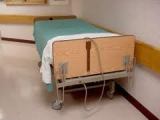|
New Resources Available for Rating Florida Nursing Homes
Thursday, January 3, 2013
By: Sarah Pusateri

January 3, 2013 | WMFE - One of the hardest decisions a family member can make is to put a loved one in a nursing home.
But after making that decision, there's another important choice: which facilty to choose.
An advocacy group for patients and families says twenty percent of the state's nursing homes are on the state's watch list.
A new internet site is the latest tool for those looking for nursing home ratings and the state already offers resource sites to rate the facilities but many health experts say it's still not enough.

Fort Pierce resident Cathi Odom knows better than most how important it is to do your research when picking a nursing home for a loved one. Her mom's been living at a home in Port St. Lucie since 2007.
"She's been dropped, she's fallen out of bed, she's had MRSA, had to have a toe amputated." Odom says.
MRSA is a serious infection that resists most antibiotics. Most recently, Odom says her mother had kidney failure, a result of dehydration.
"My mother was put in their hands to be taken care of…and they didn't take care of her."
Odom recently learned that her mother's nursing home is one of 140 on the state's watch list.
In fact, the citizen advocacy organization, Families for Better Care, says one-out-of-five nursing facilities in Florida are on that list for not meeting state standards or not making corrections quickly enough. 12 of the homes have been on the watch list for more than 100 days according to
Brian Lee, executive director for Families for Better Care, says that is unacceptable.
“It is a multi, multi-billion dollar industry and they are living off the bedsore backs of our loved ones…and making profits.”
Lee says the problem lies in the fact that many people don't know how to access information on nursing home violations and it can be difficult.
Brian Lee says the public shouldn't have to search for the information. He says the state Agency for Health Care administration, which inspects the nursing homes, should be more proactive.
"What the agency needs to do, if they've identified a nursing home to be on a watch list, is to send a press release to the local community.” Lee says. “They need to alert people within the nursing home, the residents themselves, they probably don't know and their families don’t know. Something needs to happen that will incentivize these nursing homes to provide better care for their residents."
AHCA officials say they don't put out information on nursing homes that are on the watch list because that information is available on its website.
Recently, efforts have been made to make finding data on nursing homes easier.
Websites like Nursing Home Inspect 2.0, a database created by the non-profit journalism organization ProPublica, makes it easier to search fines that nursing homes have had to pay and to read reports of violations. The information comes from the federal Centers for Medicare and Medicaid Services.
The nursing home industry doesn't like the new site because it focuses on only the negative. LuMarie Polivka-West, senior director of policy and program development for Florida Healthcare Association says it's misleading.
"If they have eight deficiencies, for example, out of 200 potential citations you will only see the eight deficiencies."
She says nursing homes always get a bad reputation for reasons that often have nothing to do with their level of care.
"We deal with that all the time as far as negative publicity with long term care. I think it's a reflection of the predominantly negative perspective of the aging process in our country and what happens to people at the end of their life in old age."
Polivka-West says, over the past two years, federal data shows that quality ratings for Florida nursing facilities have improved with the number of top facilities increasing. Meanwhile, the number of centers that got the lowest ratings has decreased.
She says the best way to pick a home for a loved one is simple: Visit it, talk to the residents, talk to the staff.
Use the information from the web sites, she says, but don't rely entirely on what you read there.
|